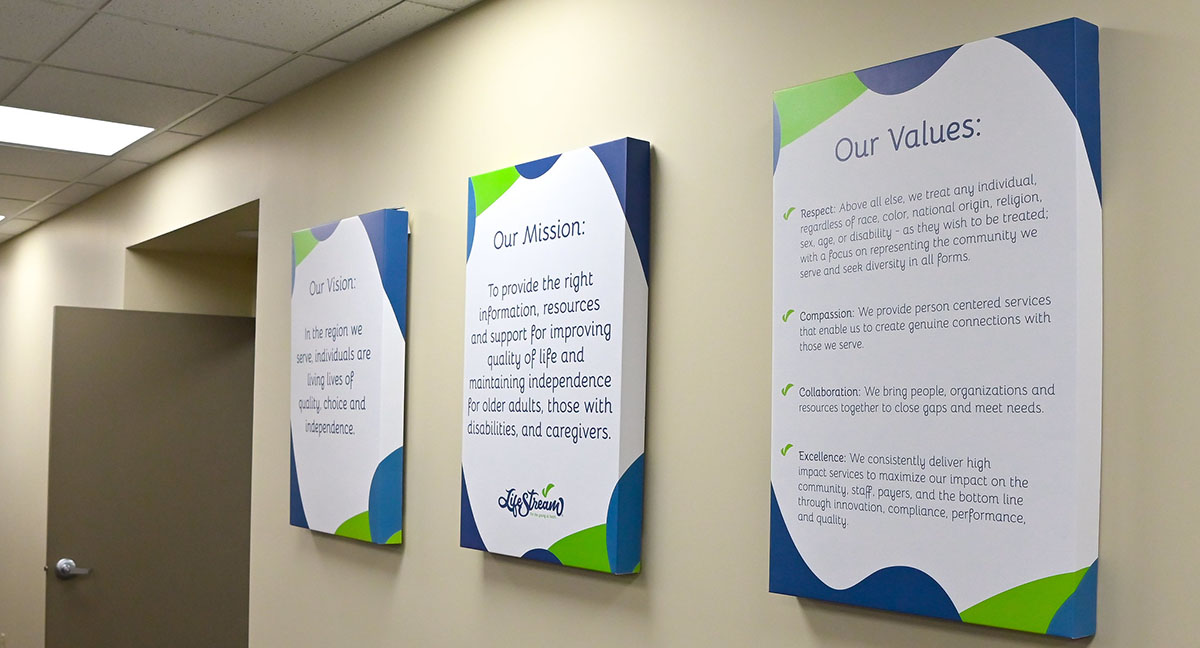Let’s face it – we’ve all experienced that moment of walking into a room, then scratching our heads as we contemplate the purpose for entering said room. There’s forgetfulness, brain fog and scatterbrain due to stress, lack of sleep, hormonal changes and more.
Dementia, however, is different. It’s characterized by a range of symptoms associated with cognitive decline that interferes with a person’s ability to think, function and socialize. As a result, everyday activities can become challenging.
It’s not unusual for the public to interchange the term “dementia” with “Alzheimer’s”, but in reality, Alzheimer’s is a type (and the most common form) of dementia. The Alzheimer’s Association reports that more than 121,000 Hoosiers aged 65 and older have Alzheimer’s (this doesn’t include those with other types of dementia such as Lewy body, frontotemporal, vascular, Huntington’s and more). According to Jenny Hamilton, president and CEO for LifeStream Services, several factors can cause issues in the brain that lead to dementia.
“Some people may have dementia after a stroke,” says Hamilton. “Others may have alcohol-induced dementia if they have long-term alcoholism issues.”
Although there is no cure, new medications are emerging, with Eli Lilly leading the way in dementia research.
LifeStream Services is a nationally accredited nonprofit that’s been around since 1975. They offer early screening for those starting to experience increased forgetfulness.
“Some people think nothing can be done, so they are reluctant to admit they’re having issues,” Hamilton says. “But the sooner you look at it, the sooner some of these interventions, i.e., medicines, could be used, which may slow the progress.”
According to the Alzheimer’s Association, an early diagnosis can improve quality of life, increase access to care and reduce financial impact.

LifeStream offers a variety of programs and services to help older adults and those with disabilities who are at risk of losing their independence. One core program they offer centers around nutrition.
“So many older people are isolated in their homes; we provide those 60 and over with a meal and socialization,” says Hamilton, who notes that the Older Americans Act defines older adults as those who are 60 years and up.
LifeStream also offers transportation services, support services that help people with services at home, as well as care management, for which they go to people’s homes to assess the services they receive and determine if, in fact, they are the right services.
“Between information assistance and care management, we have what we call our options counselors who explain things like veterans’ benefits and Medicare versus Medicaid,” Hamilton says. “We also explain the difference between a home health aide and attending care. We help people navigate the options that are available to them.”
LifeStream also provides State Health Insurance Assistance Program counseling through which they help people save money by reviewing their prescription drug plans during open enrollment.
“Even if you’re getting ready to turn 65, we can help you pick a plan that best meets your needs,” Hamilton says.
Last year LifeStream fielded more than 10,000 calls for information and assistance, and arranged more than 375,000 hours of in-home care. In addition, they did 40,000-plus transportation trips and provided 250,000-plus meals.
LifeStream offers fall prevention programs at various locations such as senior centers and housing sites. In 2000 a caregiver’s support program was added to the Older Americans Act so LifeStream assists caregivers who live with individuals with dementia, because that environment can be taxing, tiring and overwhelming.
Through a federal grant, LifeStream is currently partnering with the IU School of Medicine to offer a dementia care coaching program. It involves trained LifeStream care coaches who work with caregivers of individuals living with dementia.
“We help do evidence-based intervention to reduce their stress scores by providing respite care,” Hamilton says. “In doing so, the caregiver can feel better so they can continue taking care of their loved one while not depleting their own resources.”
LifeStream offers a one-hour training called Dementia Friends that aims to build awareness and lessen stigmas surrounding dementia, by teaching how to properly interact with a person with dementia. For example, unless you have been around someone with dementia, you may not know that it takes longer for them to form speech or think of words. Therefore, when communicating with someone with dementia, you should give them longer to respond.
Yorktown committed to becoming a dementia-friendly community by having folks in town – particularly businesses and emergency personnel – take the training.
Hamilton notes that the end goal of this training is to get people out into the community, living life.
“When people have dementia, both they and their caregivers end up staying home in isolation,” Hamilton says. “In a dementia-friendly town, however, they can go into a restaurant or business and the people working there will be much more understanding.”
LifeStream Services is located at 1701 Pilgrim Boulevard in Yorktown. To learn more about LifeStream, call 800-589-1121 or visit lifestreaminc.org. For more information about Dementia Friends, visit dementiafriendsindiana.org.





